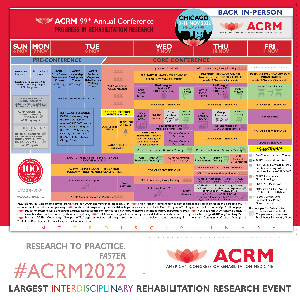Back
Aging Research & Geriatric Rehabilitation
Mediating Effect of Cognitive Function on the Path between Physical Activity and Functional Activities
Wednesday, November 9, 2022
12:47 PM – 12:52 PM
Location: Station 2

YeonJu Jin
Master’s Course, Student
Yonsei University
Wonju, Kangwon-do, Republic of Korea- IH
Ickpyo Hong, PhD. OTR
Assistant Professor
Yonsei University
Wonju, Kangwon-do, Republic of Korea
Presenting Author(s)
Non-presenting Author(s)
Research Objectives: To investigate the mediating effect of cognitive function on the path between participation in physical activity and independence of functional activities. Successful aging is associated with active social participation and physical function (Everard, Lach, Fisher, & Baum, 2000). Previous studies reported that functional activity is related to physical activity and cognitive function (Maillot, Perrot, & Hartley, 2012; Hillman, Belopolsky, Snook, Kramer, & McAuley, 2004). Cognitive function and physical activity also have a positive interaction with each other (Carvalho, Rea, Parimon, & Cusack, 2014). However, it is not clear about the relationships across physical activity, cognition, and functional activities.
Design: The research data were national claims records provided by the National Health Insurance Service in Korea. A retrospective cross-sectional design that analyzed the correlation between participation in physical activities and functional activity and the mediating effects of a cognitive function. We estimated the indirect effect of physical activity through cognitive function on the independence of functional activity.
Setting: General community.
Participants: Among the 6 million older adults covered by the national insurance program from 2002 and 2015, we retrieved a total of 3,980 beneficiaries who participated in the physical activities’ questionnaires.
Interventions: Not applicable.
Main Outcome Measures: We used three physical activity variables (energetic intensity, moderate-intensity exercise, walking exercise), total scores of cognitive functions, and the independence of functional activities.
Results: The average age of the beneficiaries was 81.6 years (SD = 5.5), and 27.3% were male. Among the three physical activities, the moderate-intensity exercise showed the largest indirect effect of cognitive function on the independence of functional activities (β = 0.05; 95% CI: 0.04, 0.07). However, the walking exercise showed the largest direct effect on the independence of functional activities (β=0.04, 95% CI: 0.01, 0.07).
Conclusions: The study findings indicated that there were positive relationships between physical activities, cognitive function, and functional activity. Furthermore, there was a mediating effect of cognitive function on the correlation between physical activities and functional activity.
Author(s) Disclosures: All authors claim no conflicts of interest.
Design: The research data were national claims records provided by the National Health Insurance Service in Korea. A retrospective cross-sectional design that analyzed the correlation between participation in physical activities and functional activity and the mediating effects of a cognitive function. We estimated the indirect effect of physical activity through cognitive function on the independence of functional activity.
Setting: General community.
Participants: Among the 6 million older adults covered by the national insurance program from 2002 and 2015, we retrieved a total of 3,980 beneficiaries who participated in the physical activities’ questionnaires.
Interventions: Not applicable.
Main Outcome Measures: We used three physical activity variables (energetic intensity, moderate-intensity exercise, walking exercise), total scores of cognitive functions, and the independence of functional activities.
Results: The average age of the beneficiaries was 81.6 years (SD = 5.5), and 27.3% were male. Among the three physical activities, the moderate-intensity exercise showed the largest indirect effect of cognitive function on the independence of functional activities (β = 0.05; 95% CI: 0.04, 0.07). However, the walking exercise showed the largest direct effect on the independence of functional activities (β=0.04, 95% CI: 0.01, 0.07).
Conclusions: The study findings indicated that there were positive relationships between physical activities, cognitive function, and functional activity. Furthermore, there was a mediating effect of cognitive function on the correlation between physical activities and functional activity.
Author(s) Disclosures: All authors claim no conflicts of interest.
Learning Objectives:
- Upon completion, participant will be able to understand the complicated relationships across participation, cognition, and functional activities.
- Upon completion, participant will be able to identify the direct effect of physical activity on functional activities.
- Upon completion, participant will be able to illustrate the mediating effect of cognitive function on the correlation between physical activity and functional activities.

.jpg)
